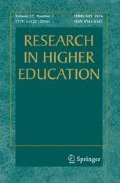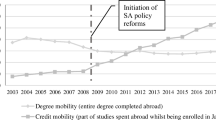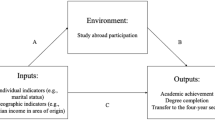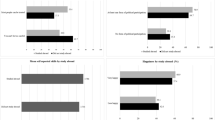Abstract
This study contributes new evidence on the factors associated with undergraduate study abroad participation and post-college volunteering. Drawing on Education Longitudinal Study 2002–2012 data, this study analyzes how students’ ascribed characteristics, academic achievement, college environment, and participation in study abroad are associated with students’ likelihood to volunteer after college. Grounded in human capital and status attainment theories, this study employs Astin’s Inputs-Environment-Outcomes framework to isolate study abroad as a high-impact education practice associated with post-college volunteering. Controlling for service-learning, previous volunteering experience, and selection bias for study abroad using inverse propensity of treatment weighting (IPTW), this study provides some of the clearest evidence that study abroad is an educational experience that promotes democratic outcomes. For study abroad program providers, these results suggest that more intentional methods of engendering a desire to improve the local situation upon returning home can further promote civic engagement. On a larger scale, these results provide some relief to the worry that American higher education is not adequately preparing students for democratic citizenship while drawing attention to the fact that only a small subset of the undergraduate population participates in study abroad to receive these benefits.


Similar content being viewed by others
References
Allison, P. D. (2002). Missing data. Thousand Oaks, CA: Sage Publications.
Altbach, P. G., & Knight, J. (2007). The internationalization of higher education: Motivations and realities. Journal of Studies of International Education,11(3–4), 290–305.
Armour, P., Burkhauser, R. V., & Larrimore, J. (2014). Using the Pareto estimation to improve estimates of topcoded earnings (Center for Economic Studies 14–21). Washington, DC: Center for Economic Studies.
Association of American Colleges & Universities. (2007). College learning for the new global century: A report from the National Leadership Council for Liberal Education America’s Promise (LEAP). Washington, DC: AAC&U.
Astin, A. (1985). Student involvement: A developmental theory for higher education. Journal of College Student Personnel,25, 297–308.
Astin, A. (1993). What matters in college?. San Francisco, CA: Jossey-Bass.
Astin, H. S., & Antonio, A. L. (2004). The impact of college on character development. In: J. C. Dalton, T. R. Russell, & S. Kline (Eds.), Assessing character outcomes in college. New directions for institutional research no. 122 (pp. 55–64). San Francisco, CA: Jossey-Bass.
Astin, A. W., & Astin, H. S. (2000). Leadership reconsidered: Engaging higher education in social change. Battle Creek, MI: W.K. Kellogg Foundation.
Astin, A. W., Sax, L. J., & Avalos, J. (1999). Long-term effects of volunteerism during the undergraduate years. The Review of Higher Education,22(2), 187–202.
Austin, P. C. (2011). An introduction to propensity score methods for reducing the effects of confounding in observational studies. Multivariate Behavioral Research,46, 399–424.
Austin, P. C., & Stuart, E. A. (2015). Moving towards best practices when using inverse probability of treatment weighting (IPTW) using the propensity score to estimate causal treatment effects in observational studies. Statistics in Medicine,34, 3661–3679.
Azur, M. J., Stuart, E. A., Frangakis, C., & Leaf, P. J. (2011). Multiple imputation by chained equations: What is it and how does it work? International Journal of Methods in Psychiatric Research,20(1), 40–49.
Barnhardt, C. S., Sheets, J. E., & Pasquesi, K. (2015). You expect what? Students’ perceptions as resources in acquiring commitments and capacities for civic engagement. Research in Higher Education,56, 622–644.
Becker, G. S. (1994). Human capital: A theoretical and empirical analysis with special reference to education (3rd ed.). Chicago: University of Chicago Press.
Berdan, S. N. (2015). Study abroad could be so much better. The Chronicle of Higher Education, April 13. Retrieved December 21, 2018 from https://www.chronicle.com/article/Study-Abroad-Could-Be-So-Much/229273.
Bowman, N. A. (2011). Promoting participation in a diverse democracy: A meta-analysis of college diversity experiences and civic engagement. Review of Educational Research,40(1), 29–68.
Bowman, N. A., Denson, N., & Park, J. J. (2016). Racial/cultural awareness workshops and post-college civic engagement: A propensity score matching approach. American Educational Research Journal,53(6), 1556–1587.
Brand, J. E. (2010). Civic returns to higher education: A note on heterogeneous effects. Social Forces,89(2), 417–433.
Bringle, R. G., Student, M., Wilson, J., Clayton, P. H., & Steinberg, K. W. (2011). Designing programs with a purpose: To promote civic engagement for life. Journal of Academic Ethics,9(2), 149–164.
Choy, S. (2001). Students whose parents did not go to college: Postsecondary access, persistence, and attainment. Washington, DC: National Center for Education Statistics.
Clark, I., Flaherty, T. B., Wright, N. D., & McMillen, R. M. (2009). Student intercultural proficiency from study abroad programs. Journal of Marketing Education,31(2), 173–181.
Colby, A., & Ehrlich, T. (2000). Higher education and the development of civic responsibility. In T. Ehrlich (Ed.), Civic responsibility and higher education (pp. 21–42). Phoenix, AZ: American Council on Education/Oryx Press.
Cruce, T. M., & Moore, J. V. (2007). First-year students’ plans to volunteer: An examination of the predictors of community service participation. Journal of College Student Development,48(6), 655–673.
Deardorff, D. K. (2010). Understanding the challenges of assessing global citizenship. Strasbourg: Council of Europe.
Dewey, J. (1916). Democracy and education. Carbondale, IL: Southern Illinois University Press.
Doyle, W. R., & Skinner, B. T. (2017). Does postsecondary education result in civic benefits? The Journal of Higher Education,88(6), 863–893.
Dwyer, M. M. (2004). More is better: The impact of study abroad program duration. Frontiers: The Interdisciplinary Journal of Study Abroad,10, 151–163.
Engle, L., & Engle, J. (2003). Study abroad levels: Toward a classification of program types. Frontiers: The Interdisciplinary Journal of Study Abroad,9, 1–20.
Finley, A., & McNair, T. (2013). Assessing underserved students’ engagement in high-impact practices. Washington, DC: Association of American Colleges and Universities.
Gillespie, J., Braskamp, L., & Braskamp, D. (1999). Evaluation and study abroad: Developing assessment criteria and practices to promote excellence. Frontiers: The Interdisciplinary Journal of Study Abroad,5(2), 101–127.
Goldstein, S. B. (2015). Predictors of preference for the exported campus model of study abroad. Frontiers: The Interdisciplinary Journal of Study Abroad, 26, 1–16.
Graham, J. W. (2009). Missing data analysis: Making it work in the real world. Annual Review of Psychology,69, 549–576.
Heeringa, S., West, B. T., & Berglund, P. A. (2010). Applied survey data analysis. London: Chapman & Hall.
Hopkins, J. R. (1999). Study abroad as a form of experiential education. Liberal Education,85(3), 36–41.
Hurtado, S., & DeAngelo, L. (2012). Linking diversity and civic-minded practices with student outcomes: New evidence from national surveys. Liberal Education,98(2), 14–23.
Institute of International Education. (2018). Open doors data. Retrieved January 9, 2019 from https://www.iie.org/Research-and-Publications/Open-Doors/Data/US-Study-Abroad#.WGa_JvkrKUl.
Ishitani, T. T. (2003). A longitudinal approach to assessing attrition behavior among first generation students: Time-varying effects of pre-college characteristics. Research in Higher Education,44(4), 433–449.
Ishitani, T. T., & McKitrick, S. A. (2013). The effects of academic programs and institutional characteristics on postgraduate civic engagement behavior. Journal of College Student Development,54(4), 379–396.
Keen, C., & Hall, K. (2009). Engaging with difference matters: Longitudinal student outcomes of co-curricular service-learning programs. The Journal of Higher Education,80(1), 59–79.
Keith, T. Z. (2015). Multiple regression and beyond: An introduction to multiple regression and structural equation modeling. London: Routledge.
Kilgo, C. A., Ezell Sheets, J. K., & Pascarella, E. T. (2015). The link between high-impact practices and student learning: Some longitudinal evidence. Higher Education,69(4), 509–525.
King, P. M., & Baxter Magolda, M. B. (2005). A developmental model of intercultural maturity. Journal of College Student Development,46(6), 571–592.
Kuh, G. D. (2008). High-impact educational practices: What they are, who has access to them, and why they matter. Washington, DC: Association of American Colleges and Universities.
Landon, A. C., Tarrant, M. A., Rubin, D. L., & Stoner, L. (2017). Beyond ‘just do it’: Fostering higher-order learning outcomes in short-term study abroad. AERA Open,3(1), 1–7.
Lewin, R. (2009). Transforming the study abroad experience into a collective priority. Peer Review,11(4), 8–11.
Lott, J. L., II. (2013). Predictors of civic values: Understanding student-level and institutional-level effects. Journal of College Student Development,54(1), 1–16.
Manly, C. A., & Wells, R. S. (2015). Reporting the use of multiple imputation for missing data in higher education research. Research in Higher Education,56(4), 397–409.
Mayhew, M. J., Rockenbach, A. N., Bowman, N. A., Seifert, T. A., Wolniak, G. C., Pascarella, E. T., et al. (2016). How college affects students: 21st century evidence that higher education works (Vol. 3). San Francisco, CA: Jossey-Bass.
McMahon, W. W. (2009). Higher learning, greater good: The private and social benefits of higher education. Baltimore, MD: Johns Hopkins University Press.
Murnane, R. J., & Willett, J. B. (2011). Methods matter: Improving causal inference in educational and social science research. Oxford: Oxford University Press.
Myers, C. B., Myers, S. M., & Peters, M. (2018). The longitudinal connections between undergraduate high impact curriculum practices and civic engagement in adulthood. Research in Higher Education, 60, 83–110. https://doi.org/10.1007/s11162-018-9504-4.
National Center for Education Statistics. (2019). Education longitudinal survey of 2002 (ELS: 2002). Retrieved January 10, 2019 from https://nces.ed.gov/surveys/els2002/.
Paige, R. M., Fry, G. W., Stallman, E. M., Josic, J., & Jon, J. E. (2009). Study abroad for global engagement: The long-term impact of mobility experiences. International Education,20, 29–44.
Parker, R. N., & Fenwick, R. (1983). The pareto curve and its utility for open-ended income distributions in survey research. Social Forces,61, 872–885.
Prentice, M. (2007). Social justice through service-learning: Community colleges as ground zero. Equity and Excellence in Education,40, 266–273.
Putnam, R. D. (2000). Bowling alone: The collapse and revival of the American community. New York: Simon & Schuster.
Reynolds, C. L., & DesJardins, S. L. (2009). The use of matching methods in higher education: Answering whether attendance at a 2-year institution results in differences in educational attainment. Higher Education: Handbook of Theory and Practice,24, 47–97.
Rhee, B. S., & Kim, A. (2011). Collegiate influences on the civic values of undergraduate students in the U.S. revisited. Asia Pacific Education Review,12(3), 345–362.
Rosenbaum, P. R., & Rubin, D. B. (1983). Assessing sensitivity to an unobserved binary covariate in an observational study with binary outcome. Journal of the Royal Statistical Society, Series B,45, 212–218.
Rubin, D. B. (1987). Multiple imputation for nonresponse in surveys. London: Wiley.
Salisbury, M. H., An, B. T., & Pascarella, E. T. (2013). The effect of study abroad on intercultural competence among undergraduate college students. Journal of Student Affairs Research and Practice,50(1), 1–20.
Sax, L. J. (2008). The gender gap in college: Maximizing the developmental potential of women and men. San Francisco, CA: Jossey-Bass.
Schafer, J. L., & Kang, J. (2008). Average causal effects from nonrandomized studies: A practical guide and simulated example. Psychological Methods,13, 523–539.
Schmidt, S., & Pardo, M. (2017). The contribution of study abroad to human capital formation. The Journal of Higher Education,88(1), 135–157.
Schneider, B., Carnoy, M., Kilpatrick, J., Schmidt, W. H., & Shavelson, R. J. (2007). Estimating causal effects using experimental and observational designs. Washington, DC: American Educational Research Association.
Shadish, W. R., Cook, T. D., & Campbell, D. T. (2002). Experimental and quasi-experimental designs for generalized causal inference. Belmont, CA: Wadsworth.
Simon, J., & Ainsworth, J. W. (2012). Race and socioeconomic status differences in study abroad participation: The role of habitus, social networks, and cultural capital. International Scholarly Research Network. https://doi.org/10.5402/2012/413896.
Smith, M. J., & Pangsapa, P. (2008). Environment and citizenship: Integrating justice, responsibility and civic engagement. London: Zed Books.
StataCorp, L. P. (2011). Stata multiple-imputation reference manual: Release 12. College Station, TX: Stata Press.
Stoner, K. R., Tarrant, M. A., Perry, L., Stoner, L., Wearing, S., & Lyons, K. (2014). Global citizenship as a learning outcome of educational travel. Journal of Teaching in Travel & Tourism, 14(2), 149–163.
Sutton, R. C., & Rubin, D. L. (2004). The GLOSSARI project: Initial findings from a system-wide research initiative on study abroad learning outcomes. Frontiers: The Interdisciplinary Journal of Study Abroad,10, 65–82.
Tarrant, M. A., Rubin, D. L., & Stoner, L. (2014). The value added of study abroad: Fostering a global citizenry. Journal of Studies in International Education,18(2), 141–161.
The National Task Force on Civic Learning and Democratic Engagement. (2012). A crucible moment: College learning and democracy’s future. Washington, DC: Association of American Colleges and Universities.
Tinto, V. (1975). Dropout from higher education: A theoretical synthesis of recent research. Review of Educational Research,45(1), 89–125.
Toutkoushian, R. K., Stollberg, R. A., & Slaton, K. A. (2018). Talking ‘bout my generation: Defining “first-generation college students" in higher education research. Teachers College Record,120(4), 1–38.
United Nations Volunteers. (2016). Volunteering as essential in achieving sustainable development: UNV responding to the 2030 agenda. UNV discussion paper. Bonn: United Nations Volunteers.
Waibel, S., Petzold, K., & Rüger, H. (2018). Occupational status benefits of study abroad and the role of occupational specificity—A propensity score matching approach. Social Science Research,74, 45–61.
Walpole, M. (2003). Socioeconomic status and college: How SES affects college experiences and outcomes. The Review of Higher Education,27(1), 45–73.
Wolniak, G. C., Seifert, T. A., Reed, E. J., & Pascarella, E. T. (2008). College majors and social mobility. Research in Social Stratification and Mobility,26, 123–139.
Yang, J. D. Y., & Schafer, J. L. (2007). Demystifying double robustness: A comparison of alternative strategies for estimating a population mean from incomplete data. Statistical Science,22, 523–539.
Youniss, J., McLellan, J. A., & Yates, M. (1997). What we know about engendering civic identity. American Behavioral Scientist,40(5), 620–631.
Zhou, H., Elliott, M. R., & Raghunathan, T. E. (2016). Synthetic multiple-imputation procedure for multistage complex samples. Journal of Official Statistics,32(1), 231–256.
Author information
Authors and Affiliations
Corresponding author
Additional information
Publisher's Note
Springer Nature remains neutral with regard to jurisdictional claims in published maps and institutional affiliations.
Appendix 1: List of College Majors by Major Category
Appendix 1: List of College Majors by Major Category
See Table 6.
Rights and permissions
About this article
Cite this article
Mitic, R.R. Global Learning for Local Serving: Establishing the Links Between Study Abroad and Post-college Volunteering. Res High Educ 61, 603–627 (2020). https://doi.org/10.1007/s11162-020-09604-w
Received:
Published:
Issue Date:
DOI: https://doi.org/10.1007/s11162-020-09604-w




